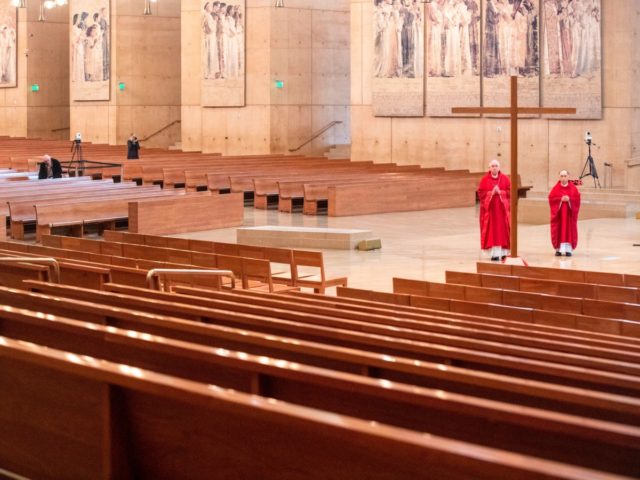A significant group of cardinals, bishops, and Catholic leaders have signed a declaration denouncing unjustified government coercion of citizens over coronavirus.
Under the “pretext” of the Covid-19 epidemic, “the inalienable rights of citizens have in many cases been violated and their fundamental freedoms, including the exercise of freedom of worship, expression and movement, have been disproportionately and unjustifiably restricted,” states the text, which bears the signatures of three cardinals, nine bishops, seven priests and theologians, 20 journalists and writers, ten medical doctors, 16 lawyers and judges, 28 university professors and intellectuals, and 14 associations.
“Public health must not and cannot become an alibi for infringing on the rights of millions of people around the world, let alone for depriving the civil authority of its duty to act wisely for the common good,” the document warns.
“This is particularly true as growing doubts emerge from several quarters about the actual contagiousness, danger and resistance of the virus,” the text continues. “Many authoritative voices in the world of science and medicine confirm that the alarmism about Covid-19 by the media appears to be absolutely unjustified.”
Not only has the reaction to the pandemic been overblown and wrongheaded, the authors assert, it also conceals murky motivations other than the health of citizens.
“We have reason to believe, on the basis of official data on the incidence of the epidemic as related to the number of deaths, that there are powers interested in creating panic among the world’s population with the sole aim of permanently imposing unacceptable forms of restriction on freedoms, of controlling people and of tracking their movements,” they claim.
“The imposition of these illiberal measures is a disturbing prelude to the realization of a World Government beyond all control,” they warn.
The leaders agree with a growing number of observers that the negative effects of lockdowns on public health and well-being will far outweigh the destruction wrought by the virus itself.
The demolition of entire sectors of the economy “encourages interference by foreign powers and has serious social and political repercussions,” the authors note. “These forms of social engineering must be stopped by those with governmental responsibility, by taking measures to protect their citizens, whom they represent and in whose interests they have a serious obligation to act.”
The criminalization of personal and social relationships must also be judged as “an unacceptable part of the plan of those who advocate isolating individuals in order to better manipulate and control them,” the text proposes.
The document warns against the dangers of new forms of surveillance being adopted to monitor the movements of citizens under the guise of better ensuring public health.
“Forms of control over people, whether through tracking systems or any other form of location-finding” must be “rigorously avoided,” the text reads, and the fight against the coronavirus “must not be the pretext for supporting the hidden intentions of supranational bodies that have very strong commercial and political interests in this plan.”
In particular, the authors continue, “citizens must be given the opportunity to refuse these restrictions on personal freedom, without any penalty whatsoever being imposed on those who do not wish to use vaccines, contact tracking or any other similar tool.”
The authors also decry the tendency to hand political responsibility over to so-called “experts,” who can claim a kind of immunity from prosecution, a phenomenon the authors find “disturbing.”
Among the many phenomena the authors criticize, they underscore a tendency by those in the media to penalize dissent from the accepted narrative by resorting to forms of censorship, which “is happening widely on social media, in the press and on television.”
“Providing accurate information requires that room be given to voices that are not aligned with a single way of thinking,” they observe. “This allows citizens to consciously assess the facts, without being heavily influenced by partisan interventions.”
“A democratic and honest debate is the best antidote to the risk of imposing subtle forms of dictatorship, presumably worse than those our society has seen rise and fall in the recent past,” they insist.
As a final note, the Catholic leaders assert the Church’s autonomy in its own realm, insisting that the State “has no right to interfere, for any reason whatsoever, in the sovereignty of the Church.”
Ecclesiastical collaboration with the State “does not authorize civil authorities to impose any sort of ban or restriction on public worship or the exercise of priestly ministry.”
“Let us not allow centuries of Christian civilization to be erased under the pretext of a virus, and an odious technological tyranny to be established in which nameless and faceless people can decide the fate of the world by confining us to a virtual reality,” they conclude.

COMMENTS
Please let us know if you're having issues with commenting.